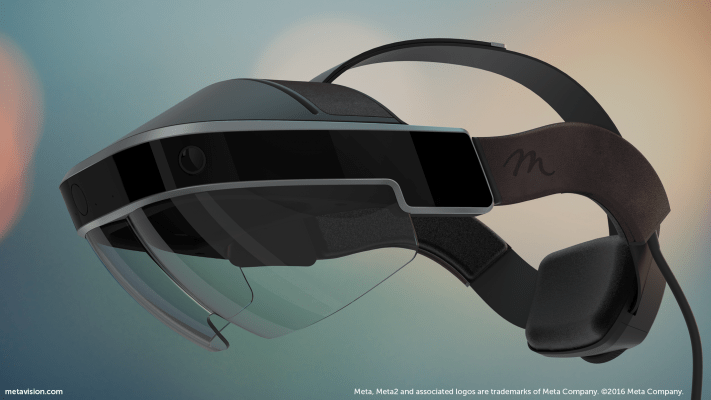The market for augmented and virtual reality technology continues to heat up, and now one of the more promising startups making both AR hardware and software has raised a $50 million round to keep up the pace.
Meta, which makes an AR headset/glasses of the same name, as well as software to run on it, has raised $50 million in a Series B round of funding. The company plans to use the money to continue building out its technology, developing apps, expanding into new markets like China, and working on the next generation of its headset, the Meta 3 — according to a short statement announcing the round. The news comes just ahead of the E3 gaming conference kicking off this week, where we may see yet more AR and VR news emerge.
(You can see our review of the Meta 2, released earlier this year, here.)
This latest round includes investments from Horizons Ventures Limited (which led its $23 million Series A round), as well as a list that includes several strategic backers with several specifically out of China: Lenovo, Tencent, Banyan Capital, Comcast Ventures, and GQY.
Meta is not disclosing its valuation, but filing documents provided to us by VC Experts points to a valuation of up to $307 million post-money for this latest round (the actual valuation depends on how many of the authorized preferred as well as common shares were issued). The Series B originally started as a $40 million round and then expanded before it closed.
Meta was founded in 2012 and is based out of Redwood City, but also has an R&D operation in Israel, where its founders hail from originally.
Many VR and AR companies tend to focus on the software end of the spectrum, developing content and technology to produce more engaging and realistic (and potentially less nauseating) experiences not just for smartphones and other screens but newer products like the Oculus Rift, Samsung VR and HTC Vive — devices that appear to be taking a lead in this still-nascent market to tap into more immersive games and other consumer media, as well as more practical enterprise applications.
Some of the most interesting of that group of software startups are getting snapped up by companies that want to make a mark in this area.
Meta is taking a different route: a vertically integrated approach in which it is using its own software development (which is heavy on computer vision, machine learning, and AI based on neuroscience) that works on hardware of its own design, which lets you immerse yourself in virtual situations that are embedded in real environments, giving you the ability to manipulate the virtual elements with gestures and other hand movements.
Taking the vertical route a road less travelled, but not entirely unpopulated. In addition to the likes of Facebook-owned Oculus, apparently Magic Leap — which is still in stealth but nonetheless valued at $4.5 billion after its last round — is also building its AR approach end-to-end, and from the ground up.
Interestingly, the investors think that Meta, despite its far more modest fundraising, could give Magic Leap a run for its money.
“In our view, Meta has built a world-class team,” said Bin Yue, Founding Partner of Banyan Capital, in a statement. “Meta is probably the only startup which has the capabilities to compete with giant companies’ projects like Microsoft Hololens and Magic Leap.”
Back when Meta was more of an idea than a publicly available product, I met Meron Gribetz, Meta’s CEO, for a demo of its prototypes and saw that he had an incredibly focused and singular vision of how he wanted to develop the company. The headset they were working on, he said at the time, was something they wanted to be easy enough to use that it could be attainable by the mass market. That was years ago, and so it’s great to see them coming along so far.
“It is incredibly gratifying to have the support of big thinkers and investors who understand the importance of creating a new human-computer interface, anchored in science. Our… investors really get what we’re doing and why Meta is different from the other players in AR,” he said in a statement today. “They understand that the combination of our advanced optical engines along with our neuroscience-based interface design approach are what will create a computing experience that is 100 times easier to use and more powerful than traditional form factors.”
Meta’s funding is a sign of how investors are keen to get in early in what is still far from a mainstream industry, but also a mark of how no one is quite sure which way it will develop.
“Augmented reality represents a transformational platform for communication, collaboration and how individuals will work in the future,” said Michael Yang, Managing Director at Comcast Ventures, in a statement. “Meta’s platform enables a host of new ways to conduct business across a wide array of industries. We look forward to supporting Meta as our first investment in the AR market.”
While several of the investors in this round are based out of China, the GQY involvement in particular will see Meta making some significant inroads to China.
“Through the investment in Meta, GQY is looking to bring the best-in-class Augmented Reality applications to China,” said Jier Yuan, VP, North America, GQY, in a statement. “This goal will be achieved by leveraging Meta’s leading-edge AR hardware, software and GQY’s in-depth knowledge and relationships in industrial training, public transportation and education sectors in China.”
(Updated with details of valuation)
